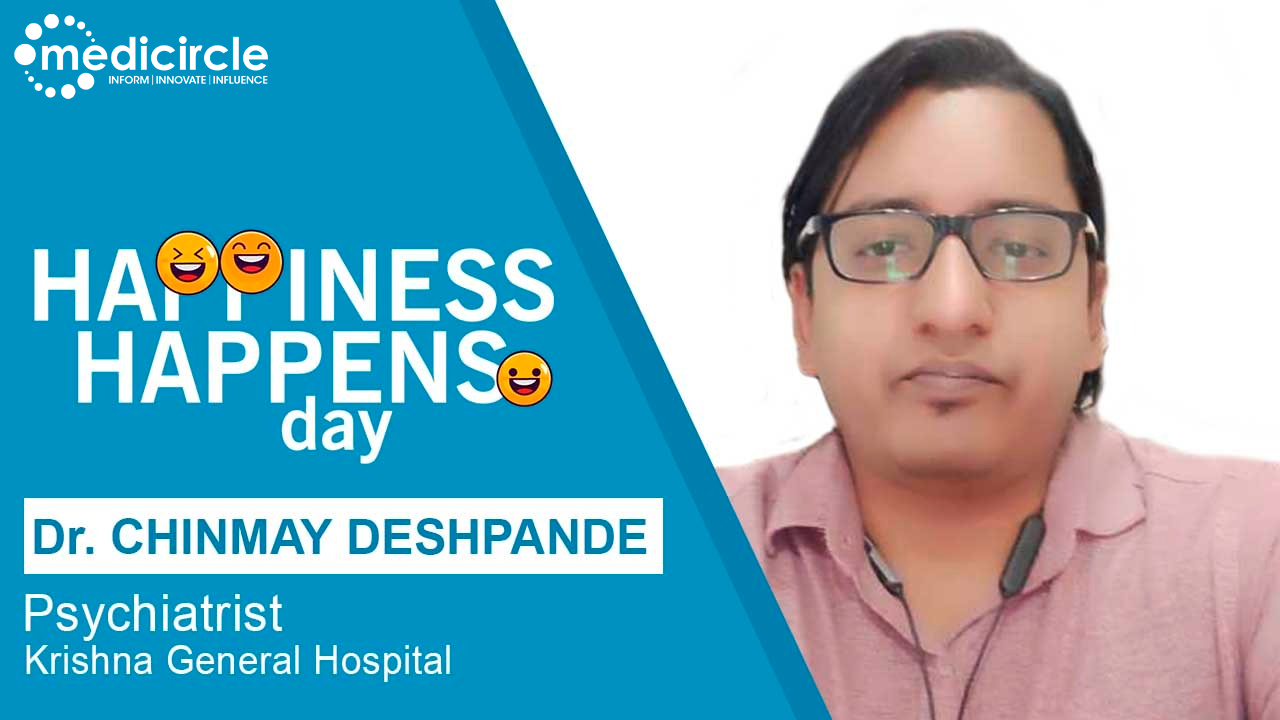In 1999, Happiness Happens Day was first celebrated by the Secret Society of Happy People. They wanted to spread the joy of being happy. They wanted people to find the brighter and positive side of life. This was to draw the people away from negativity and depression. According to the report by World Happiness, it is seen that India is repeatedly losing its spot on the Happiness Index. There are many indices where India is thriving be it the number of startups, our economy, and more. In 2019, India’s rank was 140 out of 156 nations whereas the rank was 117 in 2015. On the occasion of Happiness Happens, we at MediCircle will ask the experts on the importance of happiness and how people can cope up with their day-to-day stress.
Dr. Chinmay Deshpande is the Founder Director of Euthymia - Psychological Wellness Centre based in Pune. He is an assistant professor at Smt. Kashibai Navale Medical College and General Hospital. He is a psychiatrist who provides treatment for emotional and psychological patients using rational and realistic methods.
Definition of Happiness
He explains, “There is no one definition to happiness. The definition changes with every person. For some happiness would be to receive two full meals a day. For others, it might be to get a BMW. So happiness varies, depending on one’s social statuses, financial statuses, religion, culture and more. Happiness is a state of mind. If you are satisfied with what you have then you would be happy. But if you desire more, as the saying goes in the Bhagavad Gita that the more one tries to stimulate their five senses the lesser happiness they will have. No matter how many movies you watch, or how much music you hear, or the food you eat, it would provide you joy only for that moment. It will never be able to provide you with unlimited happiness. To be really happy one would need to be satisfied. It is this satisfaction that will lead you to happiness. A happy state of mind will have contentedness, completeness, blissfulness and satisfaction. Other than this there is no definition of happiness.”
How being happy translates into being healthy
He says, “This answer comes with hints of spiritualism. Again quoting Bhagavad Gita where the saying is that we have everything that we need but not everything that we are greed for. So by focusing on our needs we can keep our body and mind healthy. For instance, we need food thrice a day and a good night's sleep. These are needs. But we also have Free Will. This pushes us to have higher expectations and higher goals. Such expectations create more expectations which create more anxiety as we try to reach the high limit we have set. When this expectation of ours is not met we fall into depression. There are many who in the wake of achieving their expectations change their days into nights. This is done against our body’s natural clock. The night is where our body partakes in metabolism activities. And the day is where the converted energy from the previous night is used. So by reversing the cycle you are inviting problems for your own body.”
How is our personality tied with happiness?
He tells, “Happiness is just one emotion out of six. The other emotions are sadness, anger, fear, disgust, and surprise. All these emotions are within us. We utilize these six emotions throughout our day. When it comes to personality development, it is not feasible to stay happy all the time. What we should do is tackle a problem or challenge by not resorting to emotions like anger, depression, and sadness. What is a personality if not our reaction to the problem? When we say someone has a worrisome personality, then we are pointing out that the person uses worry emotion when faced with a challenge. Similarly, there are people who are fearless. So if you pay attention the other five emotions play a stronger role than happiness.”
Staying happy in spite of Covid
He mentions, “As I had mentioned earlier, happiness is an emotion, and just like all emotions they are fleeting. If you wake up and get good news then you are happy for those few moments but then your routine starts and you are back to normal. Just like that even during covid are emotions are temporary. In such difficult times, we should be practical and rational. Our frontal lobe, which only humans pose, can control our emotions. So try and control your negative emotions.”
His parting words
He advises, “Be content, be grateful. There have been two covid waves and you have still survived. Be grateful for that. Also, be grateful that you have your family and their support. You can’t always be happy. So try and be content. With your privilege try and help others.”
(Edited by Priyal Shah)

 Happiness is a fleeting emotion. There are five other emotions that come naturally to us. Try and stay as positive and rational as you can in the face of difficulties.
Happiness is a fleeting emotion. There are five other emotions that come naturally to us. Try and stay as positive and rational as you can in the face of difficulties. 






.jpeg)


.jpg)









.jpeg)





.jpg)




.png)



